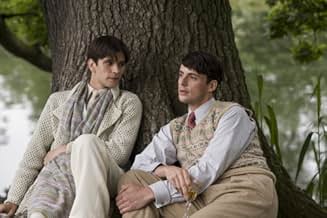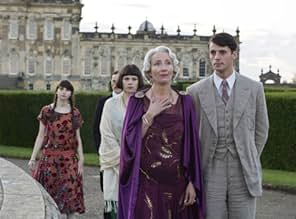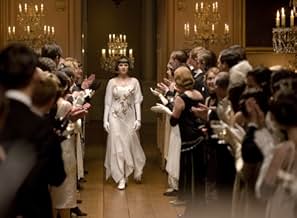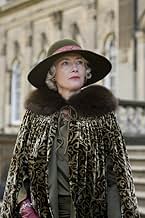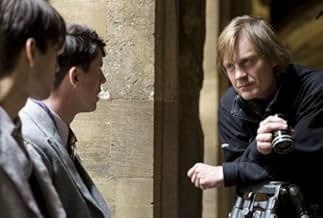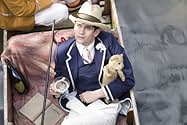IMDb-BEWERTUNG
6,6/10
14.032
IHRE BEWERTUNG
Eine ergreifende Geschichte über verbotene Liebe und den Verlust der Unschuld, die in England vor dem Zweiten Weltkrieg spielt.Eine ergreifende Geschichte über verbotene Liebe und den Verlust der Unschuld, die in England vor dem Zweiten Weltkrieg spielt.Eine ergreifende Geschichte über verbotene Liebe und den Verlust der Unschuld, die in England vor dem Zweiten Weltkrieg spielt.
- Regie
- Drehbuch
- Hauptbesetzung
- Auszeichnungen
- 11 Nominierungen insgesamt
Empfohlene Bewertungen
The greatness of the original Brideshead Revisited was in the luxury of being able to transpose a very complicated emotional and intellectual book into words. It succeeded in this, but only just, due to superb direction, photography and script which, even in its sparseness, only just allowed the successful transition to film. The problem with anything shorter is that, if it took Mortimer so many episodes to get it right, then there are very few writers who could even get near in under 4 hours, if that. So lets stop beating about the bush. This is a sound reproduction of the calender plot but after that it is not Brideshead Revisited. Call it by another name and I will laud it. It brings in a strong homosexual element and a early sexual attraction between Charles Ryder and Miss Flyte. With that everything becomes unbalanced. Motivations change. The beauty of the original is that it hinted at ????something (a je ne sais quoi) and it was that and the ever strengthening Catholic awareness of family that made this film so fascinating. The original's masterpiece was the script supported by the cine photography. That has been lost. But taken as is, a pretty and interesting film which seems to be loosely based on an early fifties work by Waugh.
It's attributed to just about everybody - from Ginger Rogers to Milan Kundera - and it sounds so right: "There are no small parts, only small actors."
If you want proof and a real understanding of the adage, revisit "Brideshead Revisited," and behold the miracle of Emma Thompson's Lady Marchmain, sucking the life out of anything and anybody she touches, and Michael Gambon's delightfully dissolute Lord Marchmain. She has about 10 minutes on the screen, he perhaps four, and yet their characters will follow you out of the theater, and stay with you at length.
Thompson's work is especially dazzling because the mean, sanctimonious character is so clearly alien to the actress (in fact, I suspected miscasting when I first heard of her assignment) and also as the character is so exaggerated, almost a caricature. And yet, Thompson gives the challenge her all, and walks away with it; the performance has Best Supporting Actress written all over it.
It's difficult to believe that the man you see as Marchmain is the same actor who was the "Singing Detective" (of the superb BBC series, not the Robert Downey Jr. mishap). Gambon has a range as wide as all outdoors, and you never ever see effort in the performance. His amiable Marchmain - subtly hinting at a complex character under the surface - has a physical similarity to Gambon's Uncle Vanya on the London stage, but otherwise, it's a unique creation.
What else is there to this new "edition" of "Brideshead"? A great deal, but only if you're among those who missed both Evelyn Waugh's novel and the wonderful Granada TV realization 27 long years ago - Irons! Gielgud! Olivier! - how can you compete with that? So, if it's a first-time visit, see the movie by all means; if you can recite lines from the book or the TV series, you can survive without the new version.
In 135 minutes, the film is handling well what the TV series did so completely in - yes - 13 HOURS. Obviously, except for the basic story line (script by Jeremy Brock, of "The Last King of Scotland"), this is a different kind of animal, still "leisurely" enough, but unable to luxuriate in the smallest details as the series did. The director is Julian Jarrold, and he is doing far better than in his recent "Becoming Jane," keeps the story moving in a smooth fashion.
As to the leading roles in the film, they are all well acted, but without great impact. Matthew Goode is Charles Ryder, the focal character; Ben Whishaw is the slightly over-flamboyant Sebastian Flyte (who needs understating more than exaggerating - Anthony Andrews' performance in the TV series was exactly right); Hayley Atwell is Sebastian's sister (and rival for Charles' affection).
One amazing thing about "Brideshead" is how this story from a different time, about characters from a different world, remains interesting and meaningful. It's almost as if Waugh's work was bulletproof - not that these filmmakers were less than respectful to the author. A better test would be a Eurotrash opera version, heaven forfend.
If you want proof and a real understanding of the adage, revisit "Brideshead Revisited," and behold the miracle of Emma Thompson's Lady Marchmain, sucking the life out of anything and anybody she touches, and Michael Gambon's delightfully dissolute Lord Marchmain. She has about 10 minutes on the screen, he perhaps four, and yet their characters will follow you out of the theater, and stay with you at length.
Thompson's work is especially dazzling because the mean, sanctimonious character is so clearly alien to the actress (in fact, I suspected miscasting when I first heard of her assignment) and also as the character is so exaggerated, almost a caricature. And yet, Thompson gives the challenge her all, and walks away with it; the performance has Best Supporting Actress written all over it.
It's difficult to believe that the man you see as Marchmain is the same actor who was the "Singing Detective" (of the superb BBC series, not the Robert Downey Jr. mishap). Gambon has a range as wide as all outdoors, and you never ever see effort in the performance. His amiable Marchmain - subtly hinting at a complex character under the surface - has a physical similarity to Gambon's Uncle Vanya on the London stage, but otherwise, it's a unique creation.
What else is there to this new "edition" of "Brideshead"? A great deal, but only if you're among those who missed both Evelyn Waugh's novel and the wonderful Granada TV realization 27 long years ago - Irons! Gielgud! Olivier! - how can you compete with that? So, if it's a first-time visit, see the movie by all means; if you can recite lines from the book or the TV series, you can survive without the new version.
In 135 minutes, the film is handling well what the TV series did so completely in - yes - 13 HOURS. Obviously, except for the basic story line (script by Jeremy Brock, of "The Last King of Scotland"), this is a different kind of animal, still "leisurely" enough, but unable to luxuriate in the smallest details as the series did. The director is Julian Jarrold, and he is doing far better than in his recent "Becoming Jane," keeps the story moving in a smooth fashion.
As to the leading roles in the film, they are all well acted, but without great impact. Matthew Goode is Charles Ryder, the focal character; Ben Whishaw is the slightly over-flamboyant Sebastian Flyte (who needs understating more than exaggerating - Anthony Andrews' performance in the TV series was exactly right); Hayley Atwell is Sebastian's sister (and rival for Charles' affection).
One amazing thing about "Brideshead" is how this story from a different time, about characters from a different world, remains interesting and meaningful. It's almost as if Waugh's work was bulletproof - not that these filmmakers were less than respectful to the author. A better test would be a Eurotrash opera version, heaven forfend.
I have never read the book or seen the miniseries, so my experience wasn't clouded by already existing expectations and assumptions of the characters. Instead I was awaiting a first, and therefore unbiased look into the world of Brideshead.
As a film, it is okay bordering on good and solid. The performances are strong enough to keep the audience interested, but they do not keep us enthralled. The leads are savvy and sexy in their own rights, but they lack true appeal as performers. They can come off as rather dull in certain scenes, but in others they pull out a subtle presence that is called for in intimate, or more emotion scenes. This inconsistence was bothersome and hindered the overall telling of the story. The one presence that is felt, but is far too short is that of Emma Thompson. As the matriarchal head of the family, she is brutal and works well with the one dimensional writing she was given. If they had focused more on her, we would have been able to understand the tortured minds of Julia and Sebastian better. Instead they have Julia and Sebastian describe her to the audience, which keeps us from getting close enough to realize what deformed her mind to begin with.
Charles is, at times to weak and unsure to be accepted as someone we want to see happy. We end up being unsure of his character's intention, and not in a mysterious, purposeful way, but in a, "the film-making is too unclear" way. Is Charles just a social climber whose dreams are dashed by his wants and Atheist ways? Or is he a moral soul lost in the pull of Brideshead's condemning Catholic trappings? This is the major flaw to the film, Charles is never exposed.
Small framing problems and out-of-style shots hampered the visual appeal, but with that aside, the visuals are very lush and the score complements some well placed montages to give the viewer a true sense of the desired never-ending summer Charles and Sebastian so desperately dream after.
If you like British tales of class and religion, or period films, this one is not a letdown. It is nothing new, but nothing terrible either. I recommend it if this is your sort of thing, I was not disappointed, but I wasn't blown away.
As a film, it is okay bordering on good and solid. The performances are strong enough to keep the audience interested, but they do not keep us enthralled. The leads are savvy and sexy in their own rights, but they lack true appeal as performers. They can come off as rather dull in certain scenes, but in others they pull out a subtle presence that is called for in intimate, or more emotion scenes. This inconsistence was bothersome and hindered the overall telling of the story. The one presence that is felt, but is far too short is that of Emma Thompson. As the matriarchal head of the family, she is brutal and works well with the one dimensional writing she was given. If they had focused more on her, we would have been able to understand the tortured minds of Julia and Sebastian better. Instead they have Julia and Sebastian describe her to the audience, which keeps us from getting close enough to realize what deformed her mind to begin with.
Charles is, at times to weak and unsure to be accepted as someone we want to see happy. We end up being unsure of his character's intention, and not in a mysterious, purposeful way, but in a, "the film-making is too unclear" way. Is Charles just a social climber whose dreams are dashed by his wants and Atheist ways? Or is he a moral soul lost in the pull of Brideshead's condemning Catholic trappings? This is the major flaw to the film, Charles is never exposed.
Small framing problems and out-of-style shots hampered the visual appeal, but with that aside, the visuals are very lush and the score complements some well placed montages to give the viewer a true sense of the desired never-ending summer Charles and Sebastian so desperately dream after.
If you like British tales of class and religion, or period films, this one is not a letdown. It is nothing new, but nothing terrible either. I recommend it if this is your sort of thing, I was not disappointed, but I wasn't blown away.
As with any film which follows a beloved mini-series it is nearly impossible to escape the shadow. When watching this film you'll find yourself constantly comparing it to the mini-series and more often than not the memory of the mini-series comes out ahead.
That being said, I still very much enjoyed the film. As with other recent English remakes (Pride & Prejudice, BBC's Sense & Sensibility) you really appreciate the beauty of modern film making. The cinematography, the score, and the ever beautiful Castle Howard, Venice, and Oxford alone are worth the watching in my opinion. There are also some great performances. Matthew Goode's Charles rivals that of Jeremy Iron's, Hayley Atwell's Julia (in a more central role than that of the mini-series) was also quite good. I also found myself rather enjoying Charles' wife Celia (Anna Madeley) even in such a small role.
The real failure of the film seems to be the difficulty with compressing 11 hours into 2. Everything is forced to move faster and the more quite, gentle, and simple scenes are lost. What's left then is a distillation of the most dramatic moments. As a result the film loses the subtlety of the mini-series. The religious bits are played up a bit too much and makes the characters slightly unbelievable. Emma Thompson is great as always, but her character of Lady Marchmain as written is too over bearing, too controlling, too inhuman. The character of Sebastian is louder than in the mini-series and becomes jaded before you care much for him. Indeed, I didn't find myself caring particularly much for any of the characters except perhaps Charles.
Still, if you don't have 11 hours on hand to spend watching the mini-series, this is a suitable substitute and is worth watching at least once at any rate. As long as you don't go in expecting an equal to the mini-series you'll enjoy it and may even find a moment or two which improves upon the original.
That being said, I still very much enjoyed the film. As with other recent English remakes (Pride & Prejudice, BBC's Sense & Sensibility) you really appreciate the beauty of modern film making. The cinematography, the score, and the ever beautiful Castle Howard, Venice, and Oxford alone are worth the watching in my opinion. There are also some great performances. Matthew Goode's Charles rivals that of Jeremy Iron's, Hayley Atwell's Julia (in a more central role than that of the mini-series) was also quite good. I also found myself rather enjoying Charles' wife Celia (Anna Madeley) even in such a small role.
The real failure of the film seems to be the difficulty with compressing 11 hours into 2. Everything is forced to move faster and the more quite, gentle, and simple scenes are lost. What's left then is a distillation of the most dramatic moments. As a result the film loses the subtlety of the mini-series. The religious bits are played up a bit too much and makes the characters slightly unbelievable. Emma Thompson is great as always, but her character of Lady Marchmain as written is too over bearing, too controlling, too inhuman. The character of Sebastian is louder than in the mini-series and becomes jaded before you care much for him. Indeed, I didn't find myself caring particularly much for any of the characters except perhaps Charles.
Still, if you don't have 11 hours on hand to spend watching the mini-series, this is a suitable substitute and is worth watching at least once at any rate. As long as you don't go in expecting an equal to the mini-series you'll enjoy it and may even find a moment or two which improves upon the original.
Every once in a few decades something like Brideshead comes along. No wonder anyone would want to try to relive that magic! So now there is Brideshead the movie. That means the director had to grasp the original TV show in two hours, so no other choice than a 'The Best Of' compilation remains, it seems.The disadvantage of it is, that what is left out suddenly becomes painfully missing.
All of us who have watched the TV series know it is virtually impossible to surpass it, in film or TV production. Nevertheless, I tried to watch it without prejudice. Overall not a bad movie, but no, not the magical resonance the original had.
All I can do is summarize in details the pluses and minuses of the film versus the TV production so here it goes:
The fathers from original were two of the best actors of the century; John Geilgud (Shakespeare) and the (incomparable) Laurence Olivier. Geilgud plays brilliantly the teasing but not totally indifferent father, who seems stop Charles from the insipid surroundings in the summer but finally lets him go. In the TV series the actor is more serious, and the fun is not there. Laurence had probably one of the best performances of all, and clearly echoes his naughtiness as he portrayed in A Little Romance then a few years earlier. His unpredictability which finally makes him decide for his daughter is well done, especially considered his playground was virtually no more than a static death bed! And then the scene where he is offered a ride in a car down the steps, which he refuses since he doesn't want to admit it might be his last.
Matthew Goode does quite a good job as a substitute of Jeremy Irons. I like especially his ambivalent apparition (homosexual, heterosexual, both, or doesn't it matter?). But he lacks the wonderful narrating voice of Irons, which research has shown to be one of the best around. In the film the romance between Charles and Sebastian's sister is elaborated much more. Partially I agree with this choice. In the original not enough scenes were implanted for credibility, except probably the scene where Charles lights her cigarette. They were virtually strangers meeting again on the cruiser years later and nevertheless they seemed to suddenly hit it off. The sister was not what stood Charles' and Sebastian's friendship in the way. The filmmakers choose for more stress on their impending romance. I think the TV original did this better; it was the family that Charles became part of, and Sebastian's indifference to love that became unsurpassable problems. In original the mother was almost invisible, with the exception of some quotes on her son like 'I don't understand it', which summed it all up. We do not need the dialog in the film where she explains herself, and wonders why her kids hate her. Understatement is much more powerful, also in the scene 'I'll say no more' between Charles and Julia, in which it becomes clear religion has driven them apart. One sentence can be enough.
All this was at the cost of stress Sebastian could have had, and got in the TV original. Most of the magic of Brideshead was simply Anthony Andrews' performance. Worse, the movie clearly alludes to a homosexual relationship, which it did not need to be. Sebastian was a love object, and could be loved by anyone, in any way. But then again, it might be hard finding someone that could deliver the line about Sebastian as Irons narrated: 'his beauty, arresting'. Charm was the problem, the danger. That missed in this film. It was charm that nearly got Charles astray, as told by the queer friend years later in his atelier. The film omitted this important scene, where that friend tried to warn Charles for Sebastian. At the time we all thought it was a nasty remark, but later on he seemed to be right. Or was the charm not an illusion after all? The film simply did not have enough time to build up the charm Sebastian surely had in the TV original. In the TV series Charles was shown first with boring friends, and it then became shortly a coming of age story, where he got introduced in a more fun crowd with Sebastian. This phase delivered some of the best scenes of the story, with his queer friend talking loud over the campus, or Sebastian dressing up as a man with mustache. Sebastian showed Charles other worlds, which real or not, were unforgettable. The film had to rush this too much, and therefore the introduction scene with the spring eggs lost its magic.
One of the few pluses was much less stress on Cordelia, the little girl. But the minus was she acted as an indirect narrator of the importance of religion. Now it had to be compensated for in dialog with the mother and Julia, which was in TV better since there meaning came out of things not said.
Many things I missed, but you can not cram all in two hours. But lines like 'I would like to remember Sebastian, how he were that summer, when we walked through the enchanted place' should have been told again.
The end was nicely done, with Charles finally not pinching candlelight, symbolic for the charm of that family that was still alive in him. I liked there the Irons narrative though 'Was it all vanity? Etc.'
I would say, it was a brave attempt, something like making a remake of 2001, or Casablanca or Breakfast at Tiffany's, and the acting was all well done. Also camera work, and story adaptation. But who can surpass Anthony Andrews, or Jeremy Irons, or Gielgud or Olivier?
All of us who have watched the TV series know it is virtually impossible to surpass it, in film or TV production. Nevertheless, I tried to watch it without prejudice. Overall not a bad movie, but no, not the magical resonance the original had.
All I can do is summarize in details the pluses and minuses of the film versus the TV production so here it goes:
The fathers from original were two of the best actors of the century; John Geilgud (Shakespeare) and the (incomparable) Laurence Olivier. Geilgud plays brilliantly the teasing but not totally indifferent father, who seems stop Charles from the insipid surroundings in the summer but finally lets him go. In the TV series the actor is more serious, and the fun is not there. Laurence had probably one of the best performances of all, and clearly echoes his naughtiness as he portrayed in A Little Romance then a few years earlier. His unpredictability which finally makes him decide for his daughter is well done, especially considered his playground was virtually no more than a static death bed! And then the scene where he is offered a ride in a car down the steps, which he refuses since he doesn't want to admit it might be his last.
Matthew Goode does quite a good job as a substitute of Jeremy Irons. I like especially his ambivalent apparition (homosexual, heterosexual, both, or doesn't it matter?). But he lacks the wonderful narrating voice of Irons, which research has shown to be one of the best around. In the film the romance between Charles and Sebastian's sister is elaborated much more. Partially I agree with this choice. In the original not enough scenes were implanted for credibility, except probably the scene where Charles lights her cigarette. They were virtually strangers meeting again on the cruiser years later and nevertheless they seemed to suddenly hit it off. The sister was not what stood Charles' and Sebastian's friendship in the way. The filmmakers choose for more stress on their impending romance. I think the TV original did this better; it was the family that Charles became part of, and Sebastian's indifference to love that became unsurpassable problems. In original the mother was almost invisible, with the exception of some quotes on her son like 'I don't understand it', which summed it all up. We do not need the dialog in the film where she explains herself, and wonders why her kids hate her. Understatement is much more powerful, also in the scene 'I'll say no more' between Charles and Julia, in which it becomes clear religion has driven them apart. One sentence can be enough.
All this was at the cost of stress Sebastian could have had, and got in the TV original. Most of the magic of Brideshead was simply Anthony Andrews' performance. Worse, the movie clearly alludes to a homosexual relationship, which it did not need to be. Sebastian was a love object, and could be loved by anyone, in any way. But then again, it might be hard finding someone that could deliver the line about Sebastian as Irons narrated: 'his beauty, arresting'. Charm was the problem, the danger. That missed in this film. It was charm that nearly got Charles astray, as told by the queer friend years later in his atelier. The film omitted this important scene, where that friend tried to warn Charles for Sebastian. At the time we all thought it was a nasty remark, but later on he seemed to be right. Or was the charm not an illusion after all? The film simply did not have enough time to build up the charm Sebastian surely had in the TV original. In the TV series Charles was shown first with boring friends, and it then became shortly a coming of age story, where he got introduced in a more fun crowd with Sebastian. This phase delivered some of the best scenes of the story, with his queer friend talking loud over the campus, or Sebastian dressing up as a man with mustache. Sebastian showed Charles other worlds, which real or not, were unforgettable. The film had to rush this too much, and therefore the introduction scene with the spring eggs lost its magic.
One of the few pluses was much less stress on Cordelia, the little girl. But the minus was she acted as an indirect narrator of the importance of religion. Now it had to be compensated for in dialog with the mother and Julia, which was in TV better since there meaning came out of things not said.
Many things I missed, but you can not cram all in two hours. But lines like 'I would like to remember Sebastian, how he were that summer, when we walked through the enchanted place' should have been told again.
The end was nicely done, with Charles finally not pinching candlelight, symbolic for the charm of that family that was still alive in him. I liked there the Irons narrative though 'Was it all vanity? Etc.'
I would say, it was a brave attempt, something like making a remake of 2001, or Casablanca or Breakfast at Tiffany's, and the acting was all well done. Also camera work, and story adaptation. But who can surpass Anthony Andrews, or Jeremy Irons, or Gielgud or Olivier?
Wusstest du schon
- WissenswertesDame Emma Thompson threatened to quit this movie if the producers persisted in pushing actress Hayley Atwell to lose weight. Atwell said that Harvey Weinstein even insulted her over lunch by saying: "You look like a fat pig on-screen. Stop eating so much."
- PatzerAfter the dinner, at which Charles first meets Lady Marchmain, the family go to pray in the private chapel. The ladies, as Roman Catholics, would have covered their heads with a scarf or a veil.
- Zitate
Sebastian Flyte: I asked too much of you. I knew it all along, really. Only God can give you that sort of love.
Top-Auswahl
Melde dich zum Bewerten an und greife auf die Watchlist für personalisierte Empfehlungen zu.
Details
- Erscheinungsdatum
- Herkunftsländer
- Offizieller Standort
- Sprachen
- Auch bekannt als
- Brideshead Revisited
- Drehorte
- Produktionsfirmen
- Weitere beteiligte Unternehmen bei IMDbPro anzeigen
Box Office
- Budget
- 20.000.000 $ (geschätzt)
- Bruttoertrag in den USA und Kanada
- 6.432.256 $
- Eröffnungswochenende in den USA und in Kanada
- 339.616 $
- 27. Juli 2008
- Weltweiter Bruttoertrag
- 13.451.186 $
- Laufzeit
- 2 Std. 14 Min.(134 min)
- Farbe
- Sound-Mix
- Seitenverhältnis
- 2.35 : 1
Zu dieser Seite beitragen
Bearbeitung vorschlagen oder fehlenden Inhalt hinzufügen


